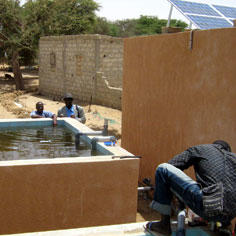
Humanitarian and Development
Place
Dara, Mauritania
Sponsor
Christian Prajalas
Grant(s)
35,000 € to the Selection Committee at 2006/01/31
Project leader
SOS Sahel International
« The Better Health at Dara project is aimed to improve the quality of the water distributed in the village of Dara and in the future health center. This is a vital prerequisite to improve the health of the local population. »
Christian Prajalas
The people of the region of Dara, in Mauritania, are in a rather deplorable state of health, particularly because the available water is unfit to drink. Waterborne diseases are rife and primarily affect the weakest members: children and the elderly. To combat this situation, the Mauritanian government has launched a Health for All program, aimed to enhance access of the population to healthcare services and simultaneously improve water quality, to eradicate the causes of disease as much as possible.
Drinking water comes first
The NGO SOS Sahel International France, a partner in this program, has proposed installing a water supply network at Dara, based on a groundwater pumping and filtration station. It will be designed to supply clean water to the future health center and the surrounding population.
SOS Sahel has called on the expertise of Veoliaforce to implement this project. Two volunteers of the unit have already been assigned to Dara, to carry out the necessary technical studies and to estimate the cost of the operations and indispensable facilities. SOS Sahel has pondered the indispensable prerequisites to guarantee the permanence of the installations and their smooth operation. It accordingly decided to involve the inhabitants right from the preparatory phases of the project, and wants to set up two committees responsible for the water and health infrastructures, which it pledges to train.
Aware of the danger incurred by the water in the region, the village community immediately welcomed this option. It has already obtained the necessary permits from the Mauritanian Ministry of the Interior and has identified the participants in the two management committees.
The 35 000 euros granted by Veolia foundation will be used to finance the program’s hydraulic investments. If this pilot experiment proves a success from the health standpoint, it can subsequently be extended to the surrounding regions suffering from similar ailments.

